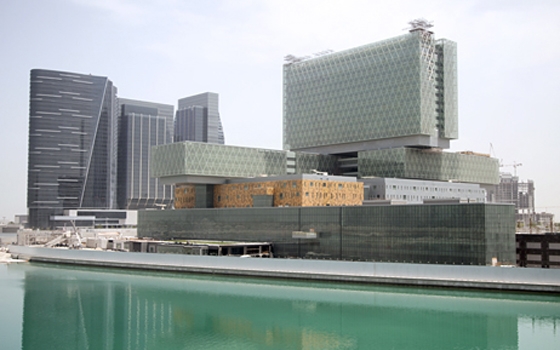Abu Dhabi is starting a financial free zone on its Al Maryah Island that could pose a direct challenge to the nine-year-old Dubai International Financial Centre, just an hour and a half's drive away.
Foreign financial firms have anticipated a free zone on Al Maryah since Abu Dhabi's government-owned Mubadala Development began building a financial district there several years ago. Free zones are common in the Arab Gulf, and typically exempt companies within them from rules forbidding majority company ownership by foreigners. Many foreign investment banks and financial services firms are not comfortable operating businesses they do not own outright, according to a banker who was briefed on the free zone project.
The new free zone, to be called the Abu Dhabi World Financial Market, was established via a federal decree issued in February but only recently published in the United Arab Emirates ' official gazette, which formally announces newly-enacted laws. A separate ministerial resolution specified Al Maryah, an island northeast of Abu Dhabi's city center, as the location of the free zone.
Lawyers say the federal law and ministerial resolution are likely the preamble to the creation of a free zone similar to the DIFC, with its own laws, regulations and court system. Since the DIFC's establishment in 2004, more than 900 companies have set up there, employing over 14,000 people, according to recently-released figures.
Abu Dhabi and Dubai are the largest of the seven emirates which make up the United Arab Emirates .
A new center in Abu Dhabi could take away business from the DIFC, some bankers and executives say. One Dubai-based financial executive questioned whether the U.A.E. market was big enough to host two financial free zones. While competition was good to a point, he said, the limited market could mean it becomes "a question of whether you're going to eat yourself."
Kai Schneider, a partner at the law firm Latham & Watkins LLP in Dubai, said the free zones in Dubai and Abu Dhabi could serve complementary purposes by focusing on different parts of the financial services industry.
"If done appropriately I think it's a great step forward," Mr. Schneider said. "I don't think it necessarily is competition for the DIFC. If you use Europe as a model, there's room for more than one financial center in a region and each financial center can focus on a separate sector of financial services. London is asset management, Luxembourg is where funds are domiciled and Ireland is where they're administered."
The federal decree lays the groundwork for a free zone in Abu Dhabi, lawyers say, and the next step will likely be emirate-level decrees by the Abu Dhabi government that establish regulatory and administrative bodies to oversee it.
Those structures could be modeled after the DIFC's – or could be entirely unique to the Abu Dhabi World Financial Market.
"For now the first steps have been taken to build a legal and regulatory framework, but it's not clear whether any particular laws, regulations or the judicial position will be the same as the DIFC," said Nick Clayson, a partner at the law firm Norton Rose in Abu Dhabi.
Despite the absence of a legal and regulatory framework for Abu Dhabi's new financial center, much of the physical infrastructure is already in place. The financial district is called Sowwah Square, and includes four new office towers with 180,000 square meters of office space. Deloitte, General Electric, Booz & Co, JPMorgan and Macquarie Bank are among 46 multinational companies that have offices there.
Dow Jones Newswires
25 April

























































